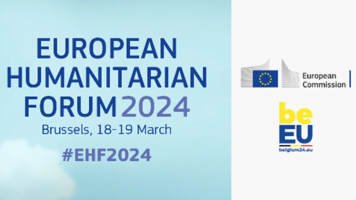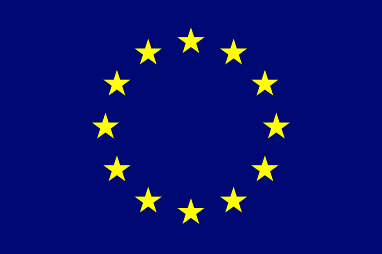European Humanitarian Forum 2024: VOICE Key Highlights

In March 2024, the European Humanitarian Forum (EHF) brought together the humanitarian community in Brussels to shed light on major humanitarian crises. VOICE and many of its members participated in the event organised by DG ECHO and the Belgian presidency of the EU, sharing their commitments, good practices, and key messages to tackle the challenges humanitarian aid faces. Here are the reflections from the VOICE network on the main topics discussed:
The Funding Gap
Addressing the funding gap has been a key political priority for DG ECHO for the past few years. This has been reflected in the successive EHF since its inception in 2022, with the funding gap being a systematic priority on the agenda. EU Member States, under the leadership of the Swedish presidency, have also embarked on the topic and adopted, in May 2023, the Council Conclusions on addressing the funding gap.
In this context, the Forum was a good occasion to give visibility to the issue and explore solutions, mainly related to expanding the donor base and increasing the efficiency and effectiveness of humanitarian aid. It also underlined the responsibility state actors have in addressing this critical issue, as highlighted by Commissioner Janez Lenarčič during his opening remarks: “The funding gap between humanitarian needs and available resources has grown to over billion euros. This enormous challenge has the simplest solution: it comes down to political will”.

However, while the Forum gave visibility, it failed to hold accountable those who can make a change. The Council Conclusions adopted in 2023 includes a voluntary target encouraging EU Member States to commit 0.7% of Gross National Income (GNI) to Official Development Assistance (ODA) by 2030 and ensure an appropriate share, for example 10%, of their ODA to humanitarian action. The Forum could have been a key momentum to take stock of the implementation of the Conclusions. However, the lack of progress in achieving the above-mentioned target was barely mentioned, and neither was the recent and disappointing outcome of the EU long-term budget revision, during which EU Member States failed to increase the EU’s humanitarian budget. (See VOICE Statement: Revision of the EU’s long-term budget: a step backwards for EU humanitarian funding).
Neglected Crises
As drawing attention to ‘forgotten‘ crises was a major objective of the Forum, many high-level panels, humanitarian talks, or exhibitions focused on under-resourced and politically neglected contexts, such as the Rohingya regional crisis, or sexual violence in the Democratic Republic of Congo. VOICE contributed to that effort and launched during the Forum the first video of its new series "From Neglect to Awareness! Uncovering Humanitarian Crises" on El Salvador.
Focusing the Forum on “forgotten crises amid the growing competition for resources” (EHF website) demonstrated the co-organisers commitments to upholding a principled, needs-based approach and to stress the importance of avoiding double standards. However, crises are not ‘forgotten’ by decision-makers, they are ‘neglected’. Neglecting a humanitarian crisis is a choice - a costly choice, not an accident. As Sofia Sprechmann, CARE Secretary-General, expressed in the high-level panel on media coverage, it is critical to be reminded of where responsibilities lie: “Supporting people in forgotten crises to tell their own stories is part of our duty to bear witness. But funding for these crises depends on political will, not how high these features in the media”.

Beyond shedding light, the EU and its Member States must take action to address neglected crises, as stressed in the VOICE Key Highlights "Neglected crises: from commitments to actions", published after a roundtable co-organised by VOICE and La Coordinadora, the Spanish platform of NGOs, in September 2023, under the Spanish EU Presidency.
Durable and efficient solutions
When looking for solutions, we quickly come down to reflecting on ways to address the source of the issue. Inevitably, strong calls to address the drivers of humanitarian needs were voiced throughout the Forum.
Among them, climate change rose high on the agenda. As highlighted by Dominic Crowley, VOICE President, during the high-level panel on building stronger community resilience through access to climate finance: “climate change and environmental degradation have become root causes of humanitarian crises, generating food insecurity, water shortages, and displacements”. The VOICE President stressed the key role NGOs play in climate resilience in fragile and conflict-affected contexts. Through climate adaptation, NGOs aim to reduce disaster impact, strengthen community resilience, and quicken recovery.

Whether referring to the need for climate resilience or to make the nexus approach a reality, participants of the Forum all agreed on the need to bring together a diversity of actors, in particular, climate, development, and peace actors. Harpinder Collacott, Executive Director Europe at Mercy Corps, stressed that “we need to understand how to make climate finance willing to go to highly fragile contexts because it’s where the needs are greater”. Mathias Mogge, Secretary General/CEO of Welthungerhilfe, highlighted that: “Among the challenges of the HDP nexus is the lack of coordination among different actors”.
Unfortunately, the Forum has not managed yet to reach a critical level of participation of actors from outside the humanitarian sphere, limiting the space for debate.
Humanitarian Space
The EHF 2024 took place amid one of the direst humanitarian crises the world has witnessed for decades. As outlined in OCHA’s March 2024 Humanitarian Access Snapshot, while the entire population in Gaza faces high acute food insecurity, intense hostilities and severe humanitarian access constraints prevent the delivery of life-saving support to civilians. Many participants called for a ceasefire, and the EU High Representative/Vice-President Josep Borrell declared in his opening speech that “starvation is used as a weapon of war” in Gaza.

Beyond these commendable calls and declarations, this must be a catalyst and a wake-up call for the EU and its Member States to mobilise all diplomatic efforts to foster peace, uphold International Humanitarian Law, and ensure the protection of humanitarian space, everywhere in the world.
In addition, NGOs, along with other humanitarian actors, strongly called on the need to protect the fundamental humanitarian principles. The risk of politicisation of aid was raised as a key concern, shrinking humanitarian space, and endangering national and international humanitarian workers and affected communities.
Protecting that space includes mitigating the impacts of restrictive measures on humanitarian aid. Florence Daunis, Operation Director at Humanity & Inclusion, summarised at the Forum the wide range of these impacts into four main categories: the risk of criminalisation, the impact on access and negotiation capacity, the risks associated with donors’ clauses, and bank de-risking.
People-centred and locally-led humanitarian response
Lastly, participants stressed that a locally-led and people-centred approach is a prerequisite to efficient and dignified humanitarian support. However, despite general agreement, the Forum - reflecting the current reality of the humanitarian system - did not manage to bring about solutions for tangible progress.
While actors from national and local organisations participated in the Forum’s discussions, many highlighted that the humanitarian system is not yet designed for local leadership and called for more direct dialogue with decision-makers. A key indicator of the lack of progress voiced by various actors is the persistently low level of funding going to local and national organisations.
While it is instrumental that international actors, including INGOs, but also the UN agencies and others, need to move forward with their reflection on the role they have in supporting localisation efforts, donors need to embark and take on the responsibility they have in creating an enabling environment for localisation to happen.
Where to next?
The Forum 2024, like its previous editions, shed light on major humanitarian crises and fostered important discussions between humanitarian actors, who were able to share the challenges they are facing and the solutions they identified.
However, to bring about the changes it aims to provoke, the Forum needs to become a space for debate, rather than a space confirming already agreed commitments. It needs to break the siloes and ensure the participation of actors outside of the humanitarian bubble, such as development, climate, peace and other actors. It needs to be a place to hold actors accountable on key topics, like funding allocations, discuss innovative solutions involving a wide range of actors, and agree on key outcomes that will be followed up until the next Forum.
Image credits: © European Commission, 2024

